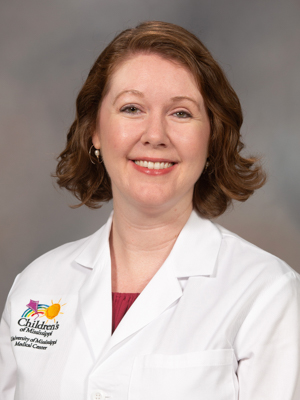Investigator highlight: Dr. Cynthia Karlson

Dr. Cynthia Karlson, associate professor of pediatric hematology and oncology and a pediatric psychologist, is part of UMMC’s pediatric cancer care team. She works with children with cancer and sickle cell disease and their families to handle the emotional, behavioral and health-related concerns resulting from these conditions. She also works with local school systems to implement modifications that may aid patients returning after surgery or treatment.
How long have you been at UMMC and what type of research do you do?
I came to UMMC as a resident in 2010. I was fortunate to stay at UMMC for fellowship and now faculty in the Department of Pediatrics, Division of Hematology/Oncology. My research focuses on cognitive outcomes, chronic pain, and overall family adjustment in children and adolescents with cancer and sickle cell disorders.
Would you describe your most recent research and/or publications?
Our current publication looked at the number of children being diagnosed with cancer in the state of Mississippi during the first four months of the COVID-19 pandemic (March to June 2020). At Children's of Mississippi we typically have 6 to 7 children who are newly diagnosed with cancer each month. Our research documented that the number of children being diagnosed with cancer dropped to 2 per month in the first three months of COVID-19 (March to May 2020). We then saw a sharp increase of 16 children diagnosed with cancer in June 2020, after the statewide stay-at-home order was lifted. Several children came to Children's of Mississippi extremely ill and multiple families discussed how they delayed going to the doctor due to the COVID-19 pandemic. Our research compared this pattern to the number of children seen in the emergency department during this time and found this was unique to children with cancer.
How does your recent research/publications relate to your overall research?
As a pediatric psychologist, my clinical work and research focuses on maximizing quality of life for children and adolescents with cancer. This starts at the time of diagnosis. I meet all new pediatric patients and their family at the time of diagnosis and follow them into long-term survivorship. Supporting our medical providers in research advocating for timely medical care in our community, under both the best and worst of situations, is one way to support our patients in their long-term battle against cancer.
What inspired your most recent research/publication?
Early diagnosis and treatment ensures that our pediatric patients with cancer have the best chance at survivorship and fewest long-term complications from their cancer. We want every child with cancer in the state of Mississippi to live a long, healthy life. Regular medical care with local pediatricians is the most important first step toward early diagnosis and treatment, even in the middle of a pandemic.
What advice can you give medical students and/or high-school students who are interesting in pursuing a career in research?
Research is the means to move clinical care and treatment forward. I recommend all medical students and students interested in the health professions get involved in a research lab to learn how research is conducted and disseminated. Find professors who are conducting research and volunteer to work as a research assistant in their lab. Most successful researchers start as unpaid research assistants in college. UMMC has wonderful summer research programs for M1 students (MSRP for all medical students and PReCEP in Pediatrics). These summer research programs have jump-started lots of medical students research careers.
Publication link: "Impact of COVID-19 Pandemic on Timing of Childhood Cancer Diagnoses."


